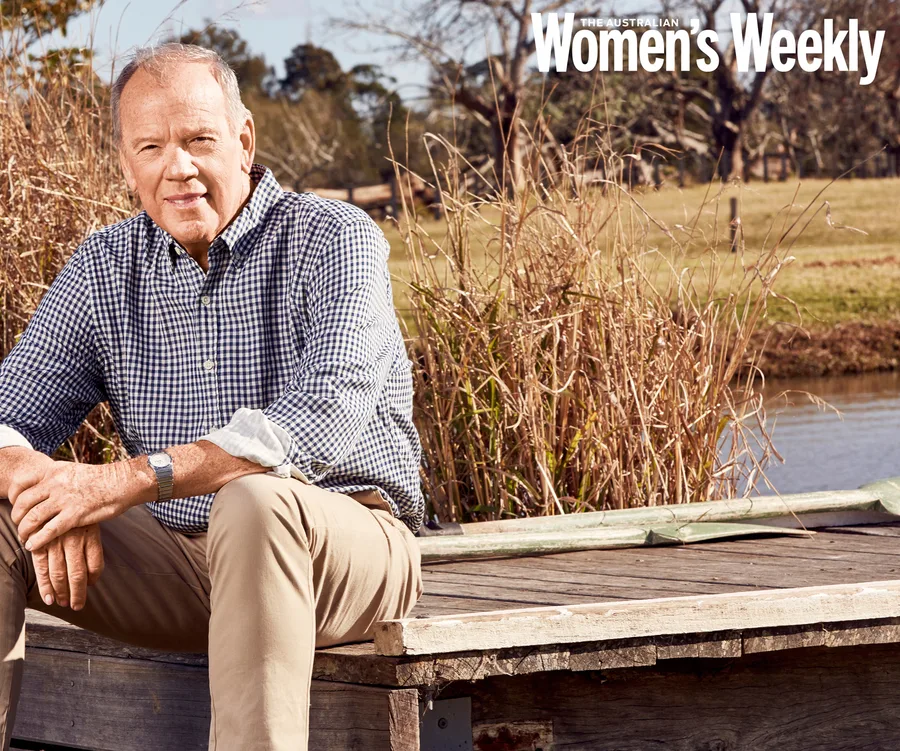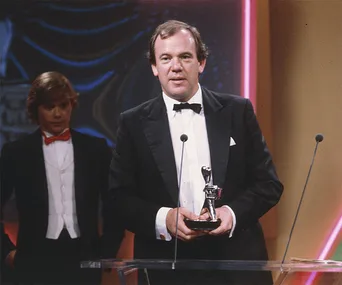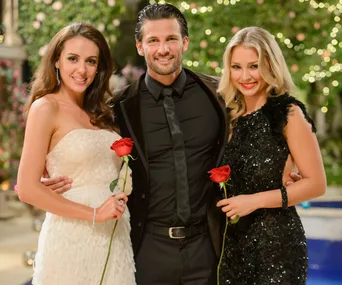Veteran Australian journalist Mike Willisee has sadly died after a long battle with throat cancer at the age of 76.
In 2017, The Australian Women’s Weekly sat down with Mike to talk about his long career and his shock diagnosis.
Read the full exclusive interview below.
Just over a year ago, Mike Willesee was told he had six, maybe 12, months to live.
His throat cancer had spread to his lungs and, although he went on to have some success with a trial drug, the disease is now back.
Yet Mike says he isn’t worried about the potential pain that awaits him, or even death itself; what he dreads most is God’s judgement.
By Mike’s own admission, he has been a sinner for half his life: “I was like a lot of young men of my era, I suppose, I’d never thought of adultery as a sin.”
It doesn’t matter that the longtime religious sceptic did an about-turn and reclaimed his childhood Catholicism two decades ago; the damage is apparently done. He figures the only place for him is purgatory – a kind of “holding cell” where he can clean up his act until he’s worthy of heaven.
“I’m pretty confident I’m not going to hell, but purgatory scares me,” says the 75-year-old veteran journalist, speaking to The Weekly in his Sydney eastern suburbs home, with paintings of Jesus’ birth and ascension on the living room wall and a chapel in another room.
“I know the rules of how you’re supposed to behave, which I’ve failed for half my life. I don’t know how I’m going to be judged.”
Memoirs lets readers make up their own minds.
To this reader at least, though, he is either exaggerating his misdeeds or has left the worst ones out of the book, because the Mike Willesee presented on the page seems no greater a sinner than most of us – merely human.
His life, however, has been epic.
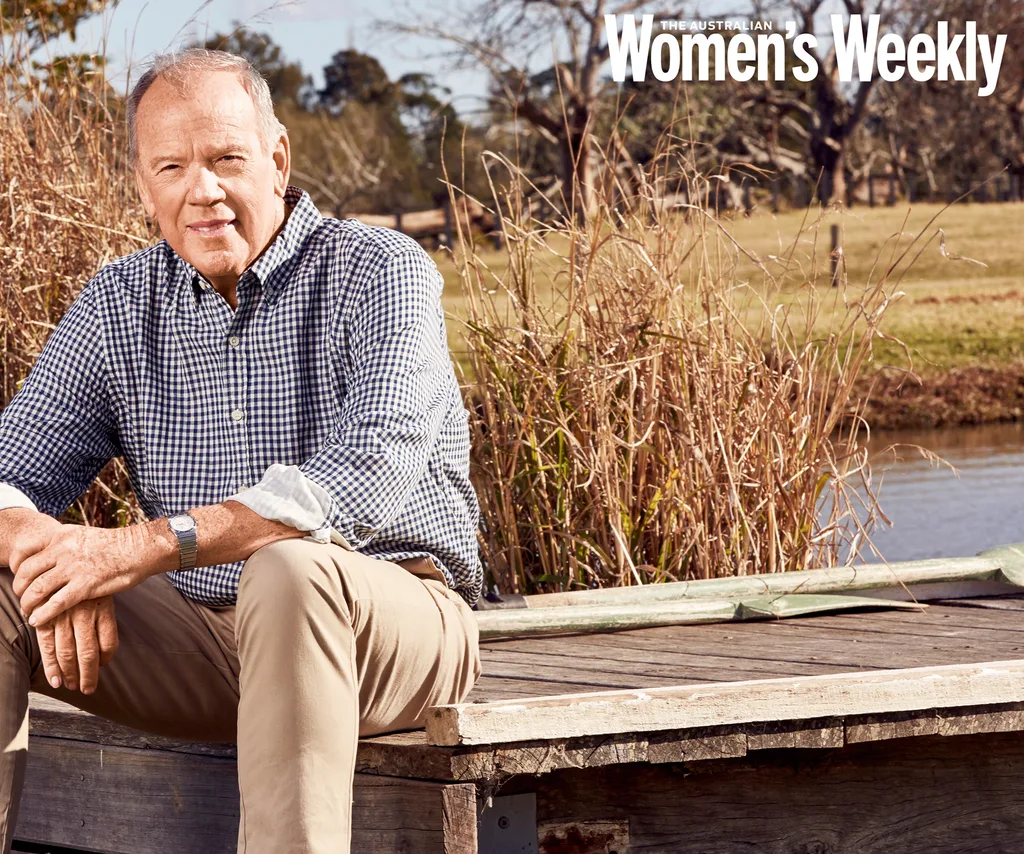
Mike died at the age of 76. (Image: AWW)
For more than 50 years he’s been one of Australia’s most famous journalists, witnessing wars and disasters and interviewing some of the world’s biggest names, from murderers to movie stars.
A television pioneer, he found fame in the 1960s on ABC’s This Day Tonight and Four Corners, and later created A Current Affair, earning a reputation for his fearless interviewing style and political influence.
Away from TV, he was a trailblazing businessman who made a fortune in the early days of FM radio and lost a chunk of it saving the Sydney Swans, running a successful thoroughbred racing stud along the way.
He has had six children with three wives, survived a plane crash, fought alcoholism and found God.
It has all the makings of an extraordinary tale and Mike has always wanted to tell it, but it wasn’t until last year’s diagnosis that the urgency kicked in.
Co-written with daughter Amy and her husband, Mark Whittaker, Memoirs chronicles Mike’s life from his difficult childhood in Perth through daring career moves and ill-advised marriages, to his mid-life crisis and religious awakening.
The publisher’s marketing blurb calls Mike an “enduring enigma” and, after a couple of hours in his company, the description seems apt.
He drops some tantalising lines in his memoir – he writes, for example, that the failure to bond with his mother led to low self-esteem and “some of the big mistakes I made in life” – but when asked to actually name them, his response is indecipherable.
“It’s too difficult to answer,” he says.
“That’s a psychological thing, but I just feel that I developed attitudes … so I reacted in some situations or made decisions based on attitudes that I’d developed.”
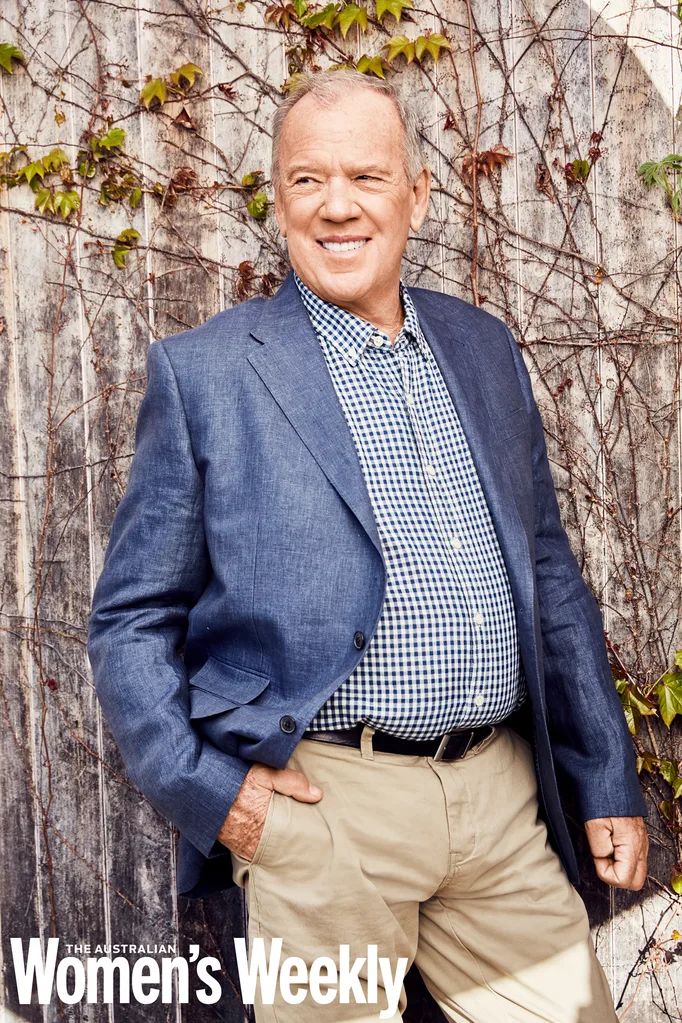
Mike had a candid memoir written about his life. (Image: AWW)
Known for his masterful interviewing technique, Mike prefers to ask the questions; he doesn’t rush to fill a silence.
He writes that he has always sought to “reach the inner person”, but he’s not about to lay himself out for the same dissection.
We get, he estimates, about 75 per cent of him in the book: “I’ve put in my failings as well as my successes, so I’ve certainly revealed a lot.”
Amy suspects he couldn’t be any more vulnerable.
“I think, for my dad, he’s revealed as much as he probably can,” says the 42-year-old author.
“It’s a much more warts-and-all view than what you would get through the television.”
For her, the biggest revelation has been her dad’s childhood, probably the most compelling part of the book.
The second of six children, Mike was born in 1942 in the working-class Perth suburb of Mount Hawthorn, unable to keep down any milk – and would have died within days if doctors hadn’t operated and discovered a defect in his digestive tract.
Scarlet fever and a fall into a fire soon followed, which meant he spent much of his first two years in hospital, separated from his mum, Gwendoline.
The two of them never managed to bridge the distance.
“I remember feeling lost as a child,” he writes, “unable to get close to her.”
Beset with a host of health problems and the demands of her burgeoning brood, Gwendoline had such constant headaches that Mike would often come home from school to find her in bed, dosed up on Bex powders.
“I wouldn’t take my problems to her,” he says, “because she had enough on her plate.”
Meanwhile, Mike’s father was an ambitious trade unionist-turned-senator in the federal Labor government, absent for half the year and always preoccupied when he was home.
Don deprived his eager-to-please son of attention and approval, sending him to the notorious Catholic orphanage in Bindoon for a while “to toughen him up”.
In the desolate landscape north of Perth, 10-year-old Mike was bullied and brutalised by the other boys, once to the point of unconsciousness, until he finally shot at his tormentors with a rifle.
“Looking back, I should have just called my father and told him to come and get me, but I never expected to get any help,” he says. “You didn’t complain, you didn’t dob, and you looked after yourself.”
A few years later, his high-school headmaster punched him to the ground. Mike was a talented football player and a bright student, but he was at the mercy of some violent, unethical Christian Brothers.
When the ALP split and Mike’s father refused to join the Catholic-dominated Democratic Labour Party, Don was labelled a communist and the headmaster set about bringing Mike down, expelling him unjustly and killing his chances of university admission.
Reading of his ordeal now, it’s hard to fathom how he could end up back in the Catholic fold.
After school, he had a short stint in the public service before answering an ad for a cadetship at the Perth Daily News.
That’s where he found his calling, beating his colleagues to the best stories.
Reporting from Vietnam in 1967 marked a coming of age, and that year he moved into television when the medium was barely a decade old, joining the ABC’s agenda-setting This Day Tonight and teaching himself the craft of TV journalism.
A 20-something self-described “shit-stirrer”, he aggravated politicians, and won viewers, with his adversarial interviews.
From then on, Mike enjoyed a speedy career rise, backing himself in the face of formidable bosses such as Sir Frank and Kerry Packer, his confidence seemingly unassailable.
Flying by the seat of his pants, he agreed in 1971 to produce his own show, A Current Affair, and he created a ratings winner.
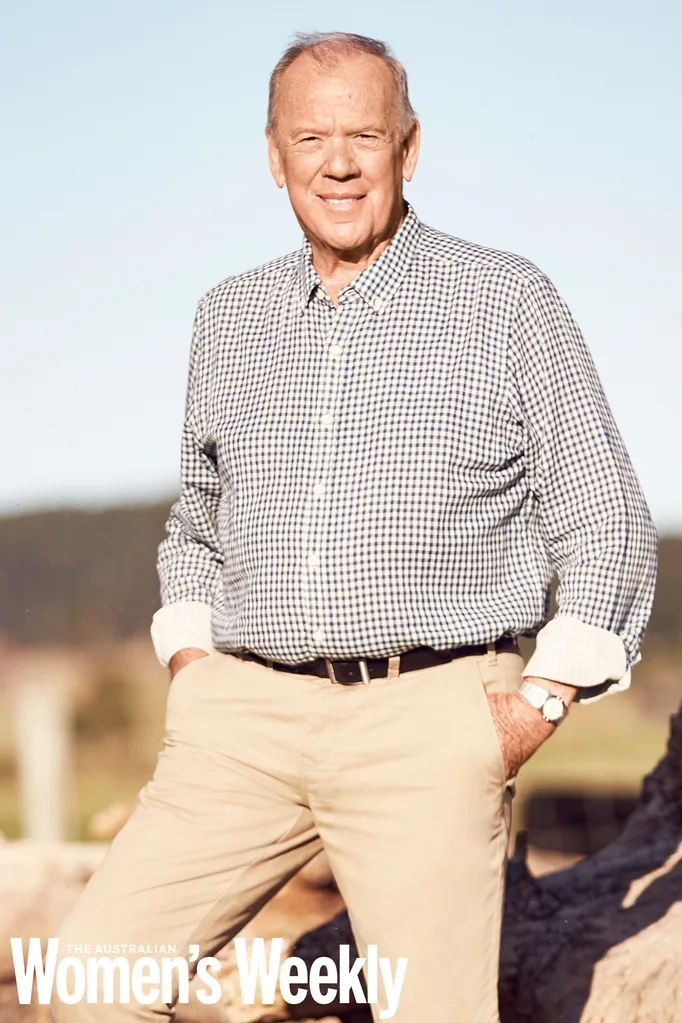
Mike enjoyed a speedy rise to success in his career. (Image: AWW)
Mike tells countless stories from the heady days of the 1970s and ’80s: his fury at being labelled a sex symbol, interviewing the likes of Bob Hope (cagey) and Sammy Davis Jr (needy) and rebuffing the advances of Sophia Loren.
His biggest coup, however, was his 1975 exclusive interview with Muhammad Ali before the boxer’s “Thrilla in Manila” showdown with Joe Frazier, when Mike beat hundreds of international journalists to the punch.
Turning his hand to business, he led a consortium into FM radio at the start of the ’80s and ended up making a staggering $50 million.
His career seemed to be on an ever-upward trajectory, but his personal life was more erratic.
In 1965, he married a former Miss Australia he barely knew and didn’t particularly like, Joan Stanbury, and he still can’t explain why.
“There was great immaturity in it, there was a complete lack of analysis or thought,” recalls Mike. “I was 23 going on about 13 emotionally.”
The pair had never had a real conversation or anything in common, and the relationship soon crumbled.
Mike had an affair with a translator in Vietnam in 1971, eventually leaving the marriage that had brought daughter Katie and son Michael into the world.
In 1976 Mike married model Carol Brent – with whom he would have three daughters, Amy, Lucy and Jo – and their early years together were among Mike’s happiest.
He wasn’t around much during the week, says Amy, but he devoted the weekends to family and friends, cuddling his kids and entertaining them with magic tricks.
From Mike’s perspective, everything changed when Jo went to pre-school in 1983 and Carol wanted a life of her own.
She went to acting classes at night and Mike would sit up, seeking solace in alcohol.
In 1987, Carol landed the coveted role of foster mum Pippa in what would become Home and Away, but Mike questioned whether she’d be able to juggle the new gig with the needs of their three girls.
Carol quit the soap, it became an international hit, and the marriage went into freefall, ending the next year.
That’s when he really hit the bottle.
In 1989 he was asked to fill in for Jana Wendt on A Current Affair and he appeared on air intoxicated.
Feeling unwell that day, he had taken two diazepam pills on a doctor’s advice, washing them down with two stiff Scotches. He is still unrepentant.
“I didn’t swear and I didn’t fall over, I just couldn’t read the autocue” – but admits it was the wake-up call he needed. “Looking like an idiot on camera, I could handle that,” says Mike. “But I couldn’t live with the fact that I was letting my life get out of control.”
He has battled his alcoholism “pretty successfully” ever since, he says, taking himself off to rehab multiple times.
Badly bruised after the divorce, he went through “a bit of a playboy period” for a decade, pretty much on permanent holiday.
“I had a couple of really nice girlfriends,” he says, “but I thought, I just cannot afford another mistake, it’ll hurt me too much, so … I’d push away, until I met Gordana.”
Watch below: Mike Willesee’s famous birthday cake interview. Story continues after video…
Gordana Poljak was his make-up artist for the 1998 Logies, and the pair got together when Mike was at a crossroads in his life. Surviving a plane crash in Nairobi a couple of months earlier had got him thinking about God, and then he met single mum Gordana, a committed Catholic who refused to stay over at his house and had statues of the Virgin Mary in her flat.
“I liked her quietness and dignity,” writes Mike.
At the same time, his longtime mate, lawyer Ron Tesoriero, had finally convinced him to investigate what he believed were supernatural happenings in Bolivia, where a woman called Katya Rivas claimed to receive messages from God.
Mike went there to prove her a fraud, but ended up a believer, filming her stigmata.
When his program Signs From God was aired in the US in 1998, 28 million viewers tuned in.
Katya’s spiritual adviser, Father Renzo, later sat Mike down for an impromptu confession and his conversion was complete.
From then on, Mike decided, he would scientifically investigate the existence of God.
Now working on his second book, Mike recently travelled to Mexico with Katya and Father Renzo.
“I’ve seen what unfortunately I needed to see,” he says, “which I didn’t have enough faith to see … Jesus working through Katya.”
Mike rejects any suggestion that his newfound faith has affected his credibility.
“Atheists will say, ‘He’s ridiculous, he’s stupid’,” says Mike, who prays every day.
“That’s just their view against mine. I don’t look down on them in any way, as they do in many cases on people who believe.”
His friends still joke about it and his family was shocked at first.
“It was a huge about-turn,” explains Amy, “but he’s never tried to push it on us and we’ve never tried to pull him away.”
Mike and Gordana married in October 1999 and their son, Rok, was born five years later, but Mike says she changed during their time together.
“The quiet young woman in dark, demure clothing was replaced by an exotic, tattoo-covered woman, wearing hot clothes and looking good,” he writes. “She left me in late 2010.”
Asked how he judges himself as a husband, he lets out a long, weary sigh.
“Very disappointed,” says Mike, now single. “Yes, it’s one of the great disappointments of my life that I didn’t succeed in having one long-running, successful, sharing marriage. That’s my deepest disappointment. However, out of those three marriages, I have six children who are my best friends.”
Now, as Mike faces the biggest challenge of his life, he seeks consolation in his faith and his family.
Asked how he would like to be remembered, he appears to steel himself.
It’s not an easy question to answer – and it has got to be brutal when you’ve just been handed a grim prognosis – but he seems to pride himself on his stoicism; he hasn’t cried since he left his oncologist’s office more than a year ago. Death, he reasons, has “happened to a lot of other people”.
Now, he says, all the money and achievements are irrelevant.
“I only really care about my family and friends,” he says. “I would just care that there was still love – that they feel some love for me and that they felt some from me. But that’s about it … There’s a great equality in death.”
As Mike writes in his book, he may be dying, but everyone else is, too – which means he may as well brush the prospect aside. “And so, with a prayer and a punt, that’s what I’ll do,” he writes. “I’ll get on with my life.”
